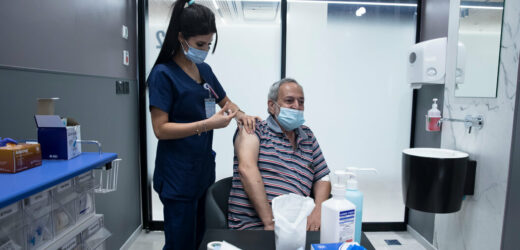As Israel struggles with a new surge of coronavirus cases, its health ministry reported Thursday that although effectiveness of the Pfizer-BioNTech vaccine remains high against severe illness, its protection against infection by the coronavirus has diminished significantly compared with this winter and early spring.
Analyzing the government’s national health statistics, researchers concluded that Pfizer’s shots, while offering vaccinated people 90 percent less risk of severe disease, gave them only 39 percent less risk against infection in late June and early July, compared with 95 percent from January to early April.
Israeli scientists cautioned that the new study is much smaller than the one in May and measured cases in a narrower window of time. As a result, a much larger range of uncertainties flanks their estimates, which could also be skewed by a variety of other factors.
Nevertheless, the new estimates are raising concern in Israel and elsewhere, including the United States. Possible reasons for the apparent loss of effectiveness against infection include the rise of the highly contagious Delta variant or a waning of protection from the shots over time.
Dr. Ran Balicer, the chairman of Israel’s Covid-19 National Expert Advisory Panel, said that the challenges of making accurate estimates of vaccine effectiveness are “immense.” He said that more careful analysis of the raw data was needed to understand what is going on.
Israel launched an aggressive campaign with the Pfizer vaccine on Dec. 20, and 58 percent of the population is now fully vaccinated, one of the highest rates in the world. Cases have increased 165 percent over the last two weeks, but hospitalizations, a measure of severe disease, continue to trend downward, according to Our World in Data, a project at the University of Oxford.
The vaccinations, paired with tight restrictions that the government imposed on travel and meetings, helped bring the country’s daily caseload down from a peak of over 8,600 cases a day in January to just a few dozen.
Israel began relaxing its restrictions in the spring. In late June, with the Delta variant spreading, cases surged again. Now, over 1,000 people are testing positive each day, including among fully vaccinated people. Epidemiologists had expected such breakthrough infections, as they do with all vaccines.
Adding to the uncertainty of the new findings is that the surge has not spread evenly across the country. Some travelers infected with the highly contagious Delta variant have brought it back to neighborhoods where vaccination rates are relatively high, while new outbreaks have yet to swamp Orthodox Jewish and Arab Israeli communities, where vaccination rates are lower. That imbalance could appear to make the vaccine seem less effective.
Also, the people who got vaccinated at the start of the campaign were over 60; those who got them later were younger. Infections among those who got vaccinated early may have more to do with their age, or some other factor that researchers have yet to take into consideration.
Understand the State of Vaccine Mandates in the U.S.
- College and universities. More than 400 colleges and universities are requiring students to be vaccinated for Covid-19. Almost all are in states that voted for President Biden.
- Hospitals and medical centers. Many hospitals and major health systems are requiring employees to get the Covid-19 vaccine, citing rising caseloads fueled by the Delta variant and stubbornly low vaccination rates in their communities, even within their work force. In N.Y.C., workers in city-run hospitals and health clinics will be required to get vaccinated or else get tested on a weekly basis.
- Can your employer require a vaccine? Companies can require workers entering the workplace to be vaccinated against the coronavirus, according to recent U.S. government guidance.
However, if the vaccine’s protection against infection is indeed waning after six months, the implications could be enormous, including on deliberations about whether to give people a third shot.
Dr. Balicer said that he and colleagues at Clalit Health Services, where he is the chief innovation officer, were working on their own study on the effectiveness of the vaccine, using Clalit’s health care records to take into account such confounding factors.
“I think there is definitely some waning, but not as much as hypothesized based on the crude data,” said Dr. Balicer, noting that other factors may be in play. “We are now trying to figure it out in a clean way.”
Source: Read Full Article

